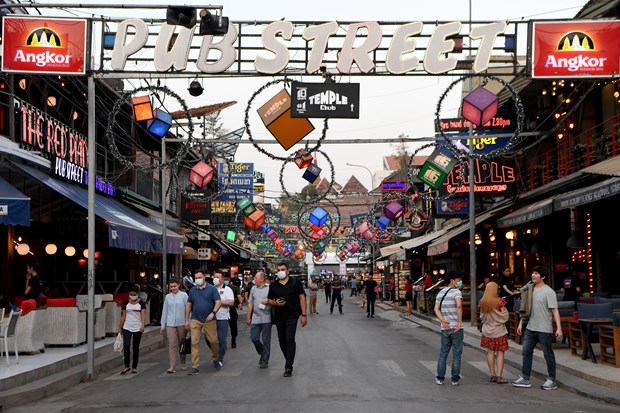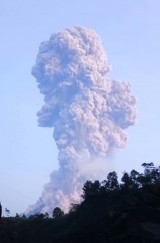Southeast Asian countries take actions against COVID-19
Countries in Southeast Asia are taking drastic actions in response to the COVID-19 outbreak as they have confirmed more infected cases over the last few days.

Tourists wear face masks while visiting a destination in Siem Reap province of Cambodia on March 5
Cambodian Prime Minister Hun Sen has ordered all schools in Siem Reap city to be shut down temporarily after the country confirmed the first Cambodian to be infected with SARS-CoV-2, the virus that causes COVID-19, on March 7.
The patient, a 38-year-old man living in northwest Siem Reap province, was tested positive for the virus by the Pasteur Institute of Cambodia.
He was among the first four persons who had direct contact with a COVID-19-infected Japanese man who travelled to Siem Reap province on February 28 and was tested positive for the virus by the Japanese health authorities on March 4 when he returned to Japan.
Meanwhile, the three others were negative for COVID-19, according to the Cambodian Health Ministry.
The Siem Reap patient was the second confirmed case of COVID-19 in Cambodia. The first is a 60-year-old Chinese man from China’s Wuhan city. He was tested positive for the virus on January 27, and discharged from hospital on February 10 after completely recovering from the disease.
So far, health authorities of Siem Reap province have found a total of eight persons having direct contact with the Japanese COVID-19 patient, and they were put in quarantine. The 40 others having indirect contact with him have been instructed to self-isolate at home, and their health are being closely monitored, the Health Ministry said.
Meanwhile, the Bank of Thailand has put more 500 THB banknotes into circulation to raise the percentage of cash that’s free of SARS-CoV-2 contamination.
Somboon Chitphentom, assistant governor of the central bank’s banknote management group, said that the notes have never been in circulation before and are hygienic.
Besides, the bank is also collecting and quarantining banknotes for 14 days, the incubation period for the virus, after which they’ll go back into circulation.
As the number of customers visiting shopping malls has been declining due to the COVID-19, the Emquartier and Emporium malls in Bangkok have installed tunnels with sanitiser sprinklers to reduce the spread of the new coronavirus before customers enter the building.
They are the first EM Auto Sanitising Gates in Thailand, which can reduce chances of the virus spreading by 90 percent.
Thailand has recorded 50 COVID-19 cases, including 18 currently under treatment. Aside from one death, 31 other patients have been discharged from hospital. The two new cases announced on March 7 are Thai citizens returning from Italy, the epicenter of the outbreak in Europe.
In another development, Malaysia and Thailand have barred the Costa Fortuna, a cruise ship carrying about 2,000 people, including dozens of Italians, from docking due to fears about COVID-19.
The ship was first turned away from Phuket island of Thailand on March 6 despite there being no suspected virus cases aboard, according to its operator.
Thai authorities had imposed restrictions "on Italians that have transited in Italy in the last 14 days", Costa Cruises said on Twitter.
The ship is carrying 64 Italians, according to Malaysian officials.
On March 7, the vessel tried to dock in the northern Malaysian state of Penang but was also refused entry. The decision was taken as Malaysia had decided to restrict entry of all cruise ships to the country's ports.
After being denied entry by Malaysia, the ship was heading to neighbouring Singapore, a Malaysian politician said.
VNA
 Malaysia, Singapore step up cooperation in environmental protection
Malaysia, Singapore step up cooperation in environmental protection
 Malaysia's digital economy projected to reach 31 billion USD in 2024
Malaysia's digital economy projected to reach 31 billion USD in 2024
 Opportunity to enhance the position of the Global South
Opportunity to enhance the position of the Global South
 Thailand to build new bridge to Cambodia
Thailand to build new bridge to Cambodia
 Bulgaria charts new course with Vietnam on President’s upcoming visit: Diplomat
Bulgaria charts new course with Vietnam on President’s upcoming visit: Diplomat
 Seminar seeks ways to boost ASEAN - Latin America connectivity
Seminar seeks ways to boost ASEAN - Latin America connectivity
 Indonesia seeks India's help in health education
Indonesia seeks India's help in health education
 Indonesia named world's most generous country in 2024
Indonesia named world's most generous country in 2024
 Philippines: Over-4m-high floodwaters make thousands of houses submerged
Philippines: Over-4m-high floodwaters make thousands of houses submerged
 Singapore’s public sector records carbon reduction in 2023
Singapore’s public sector records carbon reduction in 2023



